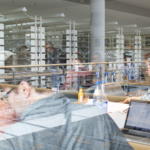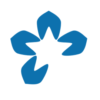In Humanities at Scale (HaS) people from twelve project partners are working together. You find more information on the HaS consortium and links to partner sites below.
DARIAH-ERIC
DARIAH (Digital Research Infrastructure for the Arts and Humanities) is the European ERIC to enhance and develop digital humanities research in Europe.
View more
DARIAH offers a portfolio of services and activities centered around research communities to help develop national initiatives and transnational research in digital arts and humanities. DARIAH was established as a European legal entity, the DARIAH-ERIC (European Research Infrastructure Consortium), on 15 August 2014 and counts 17 Members: Austria, Belgium, Croatia, Cyprus, Denmark, France, Germany, Greece, Ireland, Italy, Luxembourg, Malta, The Netherlands, Poland, Portugal, Serbia and Slovenia. As a European legal entity, the DARIAH-ERIC offers an important first step in facilitating the long-term sustainability of our work for pan-European research infrastructures for the wider European arts and humanities research community and beyond.
Role in the project:
- Project Coordination
- Dissemination
- Investigate open digital methods for humanities research
www.dariah.eu
National Centre for Scientific Research (CNRS)
The National Centre for Scientific Research is a public organisation under the responsibility of the French Ministry of Education and Research.
View more
CNRS encourages collaboration between specialists from different disciplines, in particular with universities, thus opening up new fields of enquiry to meet social and economic needs. CNRS has developed interdisciplinary programmes that bring together various CNRS departments as well as other research institutions and industry. CNRS laboratories (or research units) are located throughout France, and employ a large body of tenured researchers, engineers, and support staff.
Huma-Num is a Large Facility that aims to facilitate the digital transformation of Humanities and Social Sciences (HSS): it organises a collective dialogue with communities via consortia in HSS for the production of corpora of sources. It also provides a technological infrastructure (a grid of services, a platform for the unified access to data (ISIDORE) and long-term archiving facilities).
Role in the project:
- Training and education activities
- Integrated Service Reference Architecture
- Open Data Infrastructure
www.cnrs.fr
DANS (Data Archiving and Networked Services)
DANS promotes sustained access to digital research data.
View more
For this purpose, DANS encourages researchers to archive and reuse data in a sustained manner, e.g. through the online archiving system EASY. DANS also provides access, via NARCIS.nl, to thousands of scientific datasets, e-publications and other research information in the Netherlands. In addition, the institute provides training and advice, and performs research into sustained access to digital information. Driven by data, DANS ensures that access to digital research data keeps improving, through its services and by taking part in national & international projects and networks. DANS is an institute of the Royal Netherlands Academy of Arts and Sciences (KNAW) and the Netherlands Organisation for Scientific Research (NWO).
Role in the project:
- Integrating and Scaling National DARIAH Contributions
- Open Data Infrastructure
www.dans.knaw.nl
University of Göttingen
The University of Goettingen is an internationally renowned university placing emphasis on research and research-based teaching.
View more
The University is distinguished by the outstanding quality in its priority research areas, by its remarkable diversity of disciplines, especially in the humanities, and by a strong and deeply anchored inter-disciplinarity in the natural and life sciences. The State and University Library (SUB) of UGOE is one of the largest scientific university libraries and one of the leading research infrastructure innovators in Germany. It participates in numerous national and international activities in the context of digital humanities, virtual research environments, digital preservation research data management and open access.
Role in the project:
- Supporting the Lifecycle of Digital Humanities Basic Services
- Develop an Open Method Infrastructure
www.uni-goettingen.de
University of Aarhus
Aarhus University is a comprehensive research intensive university.
View more
Its Faculty of Arts has 13.000 students in humanities, information studies and digital design, education studies and theology. Aarhus University and Faculty of Arts have extensive external collaboration with industry and civic society as well as with other HE institutions. Aarhus University and Faculty of Arts hosts the Danish RI for Humanities, DIGHUMLAB-DK in collaboration with 4 other DK universities and with archival and heritage institutions. Faculty of Arts operates on a strategic level to enhance digital humanities.
Role in the project:
- Dissemination activities
- Organisation of an Ethic Board and an Innovation Board for DARIAH
- Organisation of a DARIAH Innovation Conference
www.au.dk
Institute of Ethnology and Folklore Research (IEF)
The Institute of Ethnology and Folklore Research is a center for folkloristic, ethnological, ethnomusicological and related scientific research in the Republic of Croatia.
View more
The IEF’s emphasis is on interdisciplinary and transdisciplinary critical research of culture. The activity of the Institute encompasses empirical and theoretical research; gathering and critical processing of data and ensuring their availability; writing, presenting at gatherings and publishing of scientific and professional work; participating in higher education and educational projects; publishing parts of prepared material in printed and electronic form and on CDs and DVDs; services of the specialized library; writing expertise and participating in committees of local and regional governments; application of research results in schools and education, publishing, art and economy; production of folklore festivals, organizing exhibitions, aiding amateur art and folklore groups, cooperation with media and the domestic and international scientific and cultural public in general.
Role in the project:
- Integrate new regional communities
www.ief.hr
Academy of Athens
The Academy of Athens is one of the major research centres in Greece, with a long history of excellence particularly in the humanities.
View more
The Acedemy has recently launched a comprehensive digitization project covering all past humanities research infrastructure resources.
Role in the project:
- Integrate new regional communities
www.academyofathens.gr
National University of Ireland Maynooth
An Foras Feasa is one of Maynooth’s flagship institutes in the Faculty of Arts, Celtic Studies, and Philosophy facilitating and encouraging research across the Faculty.
View more
It does this by hosting a wide variety of public events and lectures, a Visiting Fellow programme, and supporting funded research. An Foras Feasa has particular expertise in digital humanities and is home to a wide variety of DH research projects, as well as the Master in Digital Humanities and the PhD in Digital Arts and Humanities. An Foras Feasa is located on Maynooth’s North Campus in the state-of-the-art Iontas Building. The Institute has world-class facilities, which include a Digital Imaging Lab, space for up to 40 postgraduate students, and a variety of teaching and meeting spaces.
Role in the project:
- Integration of Training Material
- Organization of Master Classes
www.maynoothuniversity.ie/foras-feasa
National Research Council of Italy (CNR)
The National Research Council (Cnr) is the largest public research institution in Italy, the only one under the Research Ministry performing multidisciplinary activities.
View more
The Opera del Vocabolario Italiano (OVI) is the institute of the Italian National Research Council (CNR) responsible for the development of the Historical Dictionary of the Italian language. The OVI Insitute is located in Florence, at the Accademia della Crusca.
The OVI is a founding member of the European Federation of National Language Institutions (EFNIL), of the Center for Historical and Theoretical Linguistics: Italian, European Languages, Oriental Languages (CLIEO), and hosts the Coordination Office of the Italian node of DARIAH-ERIC, DARIAH-IT, as well as the DARIAH-IT Funding Opportunities Hub.
At present, the OVI’s activities are centered on the development and online publication of the Tesoro della Lingua Italiana delle Origini (TLIO) – the first historical dictionary of early Italian, which is also the first section of the Historical Dictionary of the Italian language – and of the textual corpus of early Italian. It also develops and provides scholars with advanced lexicographic software. More information here: www.ovi.cnr.it
Role in the project:
- Setting up an Ambassador’s Network for DARIAH
- Exploring access of DARIAH members to Innovation Funds
www.cnr.it
Centre Virtuel de la Connaissance sur l’Europe (CVCE)
The Luxembourg-based Centre Virtuel de la Connaissance sur l’Europe (CVCE) is building the digital research infrastructure on European integration (CVCE.eu).
View more
It aims at contributing to a deeper understanding of the historical, legal, economic and political dimensions of European integration from a transnational perspective. It combines social sciences and humanities with state-of-the-art ICT-based methods to conduct research and knowledge transfer activities. Its main outputs are enhanced digital publications, which comprise enriched source material and innovative services and tools.
Role in the project:
- Setting up an Ambassador’s Network for DARIAH
- Integrating and Scaling National DARIAH Contributions
Austrian Academy of Sciences (ÖAW)
The Austrian Academy of Sciences (OeAW) is Austria’s central non-university research and science institution.
View more
Its statutory mission is to “promote science in every way”. Founded in 1847 as a learned society, today the OeAW has over 770 members and 1,450 employees dedicated to innovative basic research, interdisciplinary exchange of knowledge and the dissemination of new insights with the aim of contributing to progress in science and society as a whole. The Institute for Corpus Linguistics and Text Technology pursues a wide range of interests all of which belong into the realm of Digital Humanities. Proceeding from a long standing tradition of corpus-based linguistic and literary research, most research projects deal with digital language resources, the creation and adaptation of text corpora such as The AAC Austrian Academy Corpus and of dictionaries as well as technologies for building, accessing and exploiting such data for a wide range of disciplines.
Role in the project:
- Integrating and Scaling National DARIAH Contributions
www.oeaw.ac.at
University of Applied Sciences Potsdam (FHP)
The University of Applied Sciences Potsdam has an excellent department of Information Science.
View more
Since its foundation in 1992, the department of Information Science of the University of Applied Sciences Potsdam has built an excellent reputation among German information professionals. It is famous for its study concept, the “Potsdamer Modell”, a partly integrative training for archivists, librarians and information specialists.
Role in the project:
- Survey of basic service requirements for digital humanities projects
- Open Methods Reviews
www.fh-potsdam.de



 This project has received funding from the European Union’s Horizon 2020 Research and Innovation programme under Grant Agreement No. 675570.
This project has received funding from the European Union’s Horizon 2020 Research and Innovation programme under Grant Agreement No. 675570.
 project.
project.